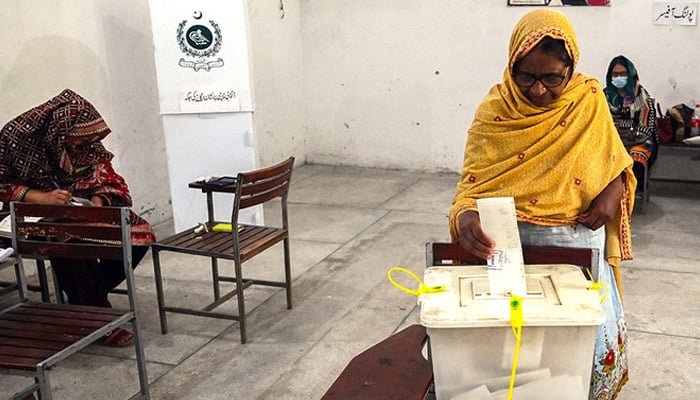40 countries, including Pakistan, go to polls in 2024
American publication asserts: "Trump goes into Republican party nomination contest as standout favourite, despite multiple criminal trials hanging over him
LAHORE: Despite the fact global economy is reeling under the challenges of surging inflation, two wars, joblessness, depleting purchasing powers at large and soaring borrowing costs in the post-COVID era, some 40 nations having a 21 percent share on the world map are due to hold elections during 2024 to pick new leaders.
These 40 countries, including Pakistan, have a combined population of 3.2 billion or 41 percent of the planet’s inhabitants and their collective Gross Domestic Product (GDP) rests at $44.2 trillion or 42 percent of the world’s total production of goods and services, though the monsters of dearth and dearness continue to haunt them as well. Of these 40 countries, 30 would be electing their new presidents.
All eyes would undoubtedly be glued on the 77-year-old Donald Trump, as many analysts think he would be striving restlessly to stage a comeback and win keys to the White House.
An American publication asserts: “Trump goes into the Republican party nomination contest as the standout favourite, despite multiple criminal trials hanging over him”.
Similarly, Russia’s Vladimir Putting would be going all out to grab power for another six years. Putin has been Russia’s leader for the past 23 years.
A Western media house has opined: “With the war in Ukraine used to lock up or silence dissenters and opponents, there is little chance of anyone standing in the way of him securing another six years in the March election if, as expected, he decides to run. His long-time nemesis Alexei Navalny is serving a 19-year sentence in a harsh penal colony”. In Pakistan, former premier Nawaz Sharif has started his political campaign to get elected for the fourth time. Court cases are troubling him. However, Asif Zardari, former president and husband of two-time premier Benazir Bhutto may not let Nawaz Sharif sail smoothly to grain the throne and wear the crown with ease.
In India, a good chunk of about 920 million voters would be exercising their right of franchise during April-May when the world’s largest democracy goes to the polls in an election in which incumbent Prime Minister Narendra Modi and his nationalist BJP party are seeking a third term.
He would largely be cashing on to his anti-Muslim and anti-Sikh stance, besides boasting of helping the world’s fifth-largest economy by nominal GDP and the third-largest by Purchasing Power Parity prosper significantly during his tenure and taking its GDP to the $3.2 trillion level.
The world’s largest transnational election will be held in June 2024, when more than 400 million eligible voters from 27 European Union countries would be electing 720 European Parliament members.
Eminent American media house “Bloomberg” states: “Starting with Taiwan in January and running through the US presidential election in November, the year will bring 40 national elections – a busy lineup even in calmer political times. They include resource-rich nations such as Indonesia and Venezuela, Mexico and politically unstable South Sudan, as well as geopolitical hot spots Taiwan and Pakistan”.
The US media outlet adds: “Tunisia, where the Arab Spring was born in 2011, may hold a presidential election around October next year. And some of the US’s traditional European allies, including Austria, Belgium and the UK, face leadership races. With two wars raging, tensions between the US and China escalating and political polarisation worsening before critical elections, the potential for disruption in 2024 is huge. Money managers and corporate planners beware: This will not be the year to keep your investment plans on autopilot”.
Research shows Bangladesh, South Korea, Panama, Lithuania, Bhutan, Finland, El Salvador, Senegal, Belarus, Iran, Portugal, Dominican Republic, Iceland, Mozambique and Uruguay etc would also be going to the polls during 2024.
-
 Woman Jailed Over False 'crime In Space' Claim Against NASA Astronaut
Woman Jailed Over False 'crime In Space' Claim Against NASA Astronaut -
 James Van Der Beek’s Close Pal Reveals Family's Dire Need Of Donations
James Van Der Beek’s Close Pal Reveals Family's Dire Need Of Donations -
 Prince William And Harry's Cousins Attend 'Wuthering Heights' Event
Prince William And Harry's Cousins Attend 'Wuthering Heights' Event -
 Hailey Bieber Turns Heads Just Hours After Major Business Win
Hailey Bieber Turns Heads Just Hours After Major Business Win -
 King Charles' Andrew Decision Labelled 'long Overdue'
King Charles' Andrew Decision Labelled 'long Overdue' -
 Timothee Chalamet 'forever Indebted' To Fan Over Kind Gesture
Timothee Chalamet 'forever Indebted' To Fan Over Kind Gesture -
 Columbia University Sacks Staff Over Epstein Partner's ‘backdoor’ Admission
Columbia University Sacks Staff Over Epstein Partner's ‘backdoor’ Admission -
 Ozzy Osbourne's Family Struggles Behind Closed Doors
Ozzy Osbourne's Family Struggles Behind Closed Doors -
 Dua Lipa Claims Long-distance Relationship 'never Stops Being Hard'
Dua Lipa Claims Long-distance Relationship 'never Stops Being Hard' -
 BTS Moments Of Taylor Swift's 'Opalite' Music Video Unvieled: See Photos
BTS Moments Of Taylor Swift's 'Opalite' Music Video Unvieled: See Photos -
 Robin Windsor's Death: Kate Beckinsale Says It Was Preventable Tragedy
Robin Windsor's Death: Kate Beckinsale Says It Was Preventable Tragedy -
 Rachel Zoe Shares Update On Her Divorce From Rodger Berman
Rachel Zoe Shares Update On Her Divorce From Rodger Berman -
 Kim Kardashian Officially Takes Major Step In Romance With New Boyfriend Lewis Hamilton
Kim Kardashian Officially Takes Major Step In Romance With New Boyfriend Lewis Hamilton -
 YouTube Tests Limiting ‘All’ Notifications For Inactive Channel Subscribers
YouTube Tests Limiting ‘All’ Notifications For Inactive Channel Subscribers -
 'Isolated And Humiliated' Andrew Sparks New Fears At Palace
'Isolated And Humiliated' Andrew Sparks New Fears At Palace -
 Google Tests Refreshed Live Updates UI Ahead Of Android 17
Google Tests Refreshed Live Updates UI Ahead Of Android 17




